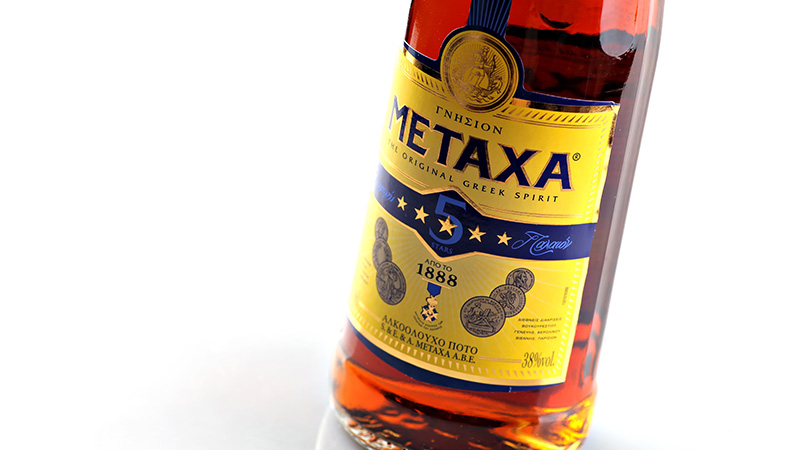With its pristine islands and welcoming dining culture, Greece is a destination that pretty much embodies vacationing. A recent wave of festive and unique Greek restaurants in the U.S. is all the proof you need — translating wanderlust into lush interiors and inventive menus, these restaurants go beyond saganaki and souvlaki, showcasing regional dishes and elevating classic comfort dishes. Their cocktails also shine a spotlight on previously unsung heroes: Greek spirits.

At Estiatorio Ornos, a glamorous new San Francisco restaurant helmed by chef Michael Mina, diners can marvel at the freshly installed crystal chandeliers and sip a lemony cocktail featuring mastiha — a sweet liqueur native to Greece — mixed with limoncello sorbet and Prosecco. At the latest addition to Chicago’s Logan Square, Andros Taverna, mastiha makes an appearance in the Genepy Sour, in which it is paired with gin and génépi, an herbaceous liqueur from the Alps. Limani, an NYC-based fine-dining establishment that recently opened a second location, features metaxa, a brandy-based Greek heritage spirit, in its white sangria.
Both spirits are deeply rooted in Greek tradition, Mastiha is produced from mastic trees growing predominantly on the North Aegean island of Chios; crystals of mastic resin are distilled and sugar is added, contributing to the liqueur’s herbal, digestif-like flavor profile. Metaxa is manufactured all over Greece in an elaborate process, in the center of which are Muscat wines from the island of Samos. It’s produced by the eponymous brand, established in 1888. Made available in the U.S. some time ago, the two have been enjoyed for decades by knowing insiders, primarily on the rocks.
Don’t miss a drop!
Get the latest in beer, wine, and cocktail culture sent straight to your inbox.

Mastiha is sweet and herbaceous with notes of pine. Amber-colored metaxa, rumored to be based on an ancient secret recipe, is citrusy and light. Its aromatic notes vary from pine to citrus to cedar, depending on the age of the spirit, which is indicated by the number of stars on each bottle. Both are, apparently, newcomers to the world of cocktails. “I do believe that a majority of these spirits are quite new in the bar scene,” says Anthony Attanasio, head bartender at Estiatorio Ornos. “While metaxa and ouzo have been carried by bars for years, it is quite rare to see them utilized in cocktails.”
That is, until now. When Attanasio was planning the cocktail list for Ornos, he realized that mastiha is, in fact, “a hidden gem” — an ingredient that can truly surprise a savvy customer with its complex softwood-like aroma and flavor.
At Andros, mastiha is favored for its versatility. “If you use the right ratios, mastiha works well with most spirits; I’ve tried it with tequila, gin, and whiskey,” says bar manager Diana Meza. “It sounds like it could be overwhelming, but the brightness of mastiha makes it a beautiful, botanic, and refreshing cocktail.”

Metaxa, on the other hand, puts a Greek spin on cocktails that are typically concocted with brandy. “The flavor of metaxa is unique and very pleasant,” says George Saites, Limani’s beverage director. “It has a sweetness that comes from the Muscat wines and citrus notes; maybe a touch of coriander. Rumor has it, rose petals are part of the botanicals, too.” Come winter, metaxa will also shine in bold, seasonal drinks: “It adds a fantastic spice quality, which bodes well with many amaros and cordials,” says Attanasio.
While relatively high in ABV — mastiha around 15 percent while metaxa at nearly 40 percent — both spirits bring flavorful smoothness; no burning sensations that can be associated with high-alcohol products. Instead, a nice, lingering herbaceous finish pairs nicely with the seafood-abundant kitchen offerings and keeps the mood fittingly light.
Plus, there’s a fun element of discovery; as travel plans continue to shift due to new Covid-19 variants, the new application of Greek spirits manages to provide the novelty and freshness we all crave — especially when set in spaces that evoke the feeling of freedom and wonder. “Mastiha is still a bit of an unknown ingredient and can be intimidating for some mixologists,” says Meza, “but I believe people find it intriguing and are excited to learn how it lends itself to great cocktails.”


